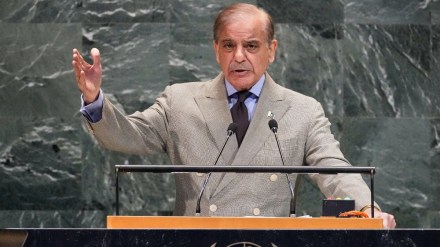Pakistan Prime Minister Shehbaz Sharif, while speaking at the General Debate of the 80th session of the UN General Assembly on Friday, accused India of violating the Indus Waters Treaty by putting it on hold.
“India’s unilateral and illegal attempt to hold the Indus Water Treaty in abeyance defies the provisions of the treaty itself as well as the norms of International law,” Sharif said.
Adding to that he mentioned that, “Pakistan has made it abundantly clear that we will defend the inseparable right of our people on these waters. To us, any violation of the treaty represents an act of war”.
India suspended the treaty as part of its counter-measures against Pakistan following the April 22 Pahalgam terror attack, in which 26 people were killed.
Context of the Indus Waters Treaty
The Indus Waters Treaty was signed in September 1960 with the World Bank’s mediation. Under the agreement, India received control over the eastern rivers – Ravi, Beas and Sutlej, while Pakistan got the western rivers – Indus, Jhelum and Chenab.
Despite multiple wars and tense relations, the treaty has survived. However, it has often faced criticism in India for being unfair in terms of water distribution.
India has accused Pakistan of misusing the treaty process to divert attention from its support of terrorism. New Delhi described Pakistan’s arbitration efforts as “a desperate attempt” to escape accountability. India has said it acted within international law by suspending the treaty and linked its revival to Pakistan ending cross-border terrorism.
Sharif voices support for Kashmir
In his UN address, Sharif also brought up the Kashmir issue. “I wish to assure Kashmiri people that I stand with them, Pakistan stands with them, and one day soon India’s tyranny in Kashmir will come to a halt,” he said.
Call for dialogue with India
Interestingly, Sharif also struck a different note by suggesting that Pakistan was ready to resume talks with India. “Pakistan stands ready for a composite, comprehensive and result-orientated dialogue with India on all outstanding issues,” he said, while once again referring to Kashmir as a region suffering under “tyranny.”
Sharif’s comments came alongside references to outside mediation in the ceasefire process. However, India has repeatedly rejected such claims. Prime Minister Narendra Modi told Parliament that no foreign leader had asked India to stop Operation Sindoor. External Affairs Minister S Jaishankar also confirmed that there was no third-party involvement and the ceasefire understanding came only through direct military talks.
Sharif also spoke about Pakistan’s role in fighting terrorism. He said the country had paid a huge price both financially and socially. “Pakistan’s sacrifices are probably the biggest around the globe,” he said, adding that terrorism had cost Pakistan $150 billion in economic losses.
